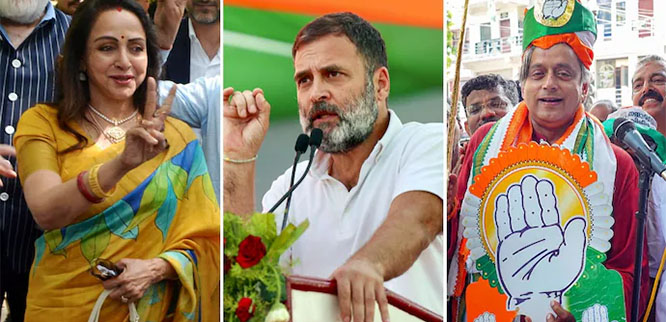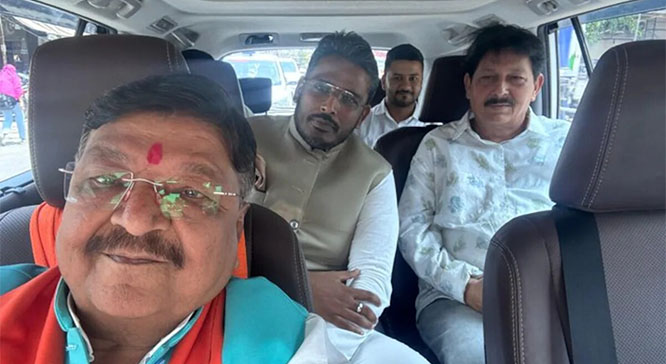New Delhi, Mar 12: Starting with his hyper-kinetic Lok Sabha campaign, Narendra Modi has unhesitatingly thrown himself in the line of fire in every ensuing state election, even at the risk of an adverse result being read as a sign of fading charisma. Morale-sapping losses in Delhi and Bihar in 2015 did not slow him down and he bounced back with a big win in Assam and a heartening performance in Kerala last year. But on many counts, the UP election was the one that really mattered.

In 2014, Modi had humbled Mandal parties that had so often cocked a snook at BJP, using his oratorial skills to good effect to present himself as a change agent who, despite his Gujarati origins, seemed at home in the heartland.
What added to the compelling drama that surrounds any election in the country's most populous state was Modi's huge political gamble of demonetising Rs 1,000 and Rs 500 notes in November, a decision that knocked 86% of available currency out of circulation. The UP election was billed both as a virtual referendum on demonetisation and a semi-final for the 2019 Lok Sabha elections. It called for all of Modi's skills as a communicator to counter a determined attack from political rivals and criticism by leading economists and intellectuals, some of whom saw the action as despotic and whimsical.
After transforming from the Hindu Hriday Samrat of Gujarat to Development Man in 2014, UP 2017 saw Modi again re-invent himself as a pro-poor welfarist. In the Indira Gandhi style, Modi in UP was the PM seeking to win a state election on the basis on his own persona, not through state leaders.
"One party wants to save its family , the other its party but only one party wants to save UP ," he thundered in Lucknow. "Our fight against corruption and black money won't stop." His personal popularity outstripping his party's, Modi was a one-man show in these polls.
Reaching out to the voter above the heads of the party , promising them a war against the rich, Modi in 2017 evoked Indira's bank nationalisation moment in 1969 when reining in the rich had become a vote winner with the poor.
Surveys by BJP in UP in November-end showed that 48% supported "notebandi". BJP leaders knew this level of endorsement would not sustain as the campaign unfolded but the move did seem to have captured the imagination of the poor. To some extent, it also enjoyed backing across caste lines. A key political constituency seemed to be forming around Modi, identifying him as a strong leader who could act against the interests of the rich and influential.
"There was some immediate distress due to notebandi. But people also saw how big contractors and local bigwigs were scampering to save their illegal money . The sullenness of those seen to deal in black money was proof that Modi had hit the right target," said a senior BJP MP from UP. BJP believes opposition parties like Congress miscalculated in attacking demonetisation as ineffective, and worse, systemic loot. The charge that BJP leaders were discreetly benefited did not damage the party, BJP leaders feel, because the PM's credibility as an untainted leader washed with the voters. Modi was able to manage public sentiment despite cash supplies normalising only gradually .
The decisive victory in UP cements Modi's standing not just as BJP's but also the country's tallest leader. Having led the party back to office in UP, he could well claim the mantle of the "saffron helmsman", the most popular leader from the Sangh corral since Atal Bihari Vajpayee. Some would argue that he has edged ahead of Vajpayee in popular reach, aided by technological advances like social media and the incessant TV coverage of his campaigns.
The effects of his knee replacements caught up with Vajpayee in his second stint as PM though he remained mentally agile. But the 2004 Lok Sabha campaign clearly brought out the limitations that his physical condition had imposed. In contrast Mo di is a relentless campaigner, fearlessly putting himself front and centre.
His decision to pull out the stops in Varanasi is being hailed as a courageous move.BJP MPs feel that more than this being a case of the PM rightfully according priority to his seat, his move reflects a risk-taking ability and a preparedness to throw his all into an election. "He is not particularly bothered that campaigning hard will be read as a failing if the results are not satisfactory . He would rather argue that there should be no room for regret," said an MP.








Comments
Add new comment